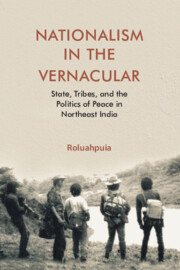Book contents
- Frontmatter
- Dedication
- Contents
- List of Figures
- Preface
- Acknowledgements
- List of Abbreviations
- Notes on Transliteration and Translation
- 1 Introduction
- 2 The ‘Tribal Question’ in India: Problem of Inclusion
- 3 The Emergence of Mizo Nationalism: The Formative Phase
- 4 The Mizo National Front and the Vernacularization of Nationalism
- 5 Violence, Counter-Insurgency, and the Transcript of Resistance
- 6 Discord, Accord, and the Politics for Peace
- 7 Conclusion
- Glossary
- References
- Index
3 - The Emergence of Mizo Nationalism: The Formative Phase
Published online by Cambridge University Press: 30 April 2023
- Frontmatter
- Dedication
- Contents
- List of Figures
- Preface
- Acknowledgements
- List of Abbreviations
- Notes on Transliteration and Translation
- 1 Introduction
- 2 The ‘Tribal Question’ in India: Problem of Inclusion
- 3 The Emergence of Mizo Nationalism: The Formative Phase
- 4 The Mizo National Front and the Vernacularization of Nationalism
- 5 Violence, Counter-Insurgency, and the Transcript of Resistance
- 6 Discord, Accord, and the Politics for Peace
- 7 Conclusion
- Glossary
- References
- Index
Summary
The year 1954 was a turning point in Mizo history for two reasons. First, the Lushai Hills were renamed as Mizo Hills, following the replacement of ‘Lushai’ with ‘Mizo’ by an Act of the parliament. Second, the traditional institution of chieftainship was abolished through an Act passed in the Assam assembly. The focus of this chapter is the event that led to the recognition of the hnam—herein ‘Mizo’—and the movement against the institution of chiefs that led to the eventual abolishing of chieftainship. In the case of the latter, given the support of the chiefs by the British, the movement for the abolishing of chieftainship was enmeshed with a strong anticolonial fervour. Protests and mobilization against colonial rule were intertwined with resentment against the continuation of chiefs’ rule. Furthermore, the role of the MU has largely been overlooked, if not undermined, when it comes to Mizo political history in general and Mizo nationalism in particular. The idea of ‘Mizo’ and the promise of a new future in the post-British-rule era articulated by the MU were to shape and define the future political contour.
Often, tribes are assumed as apolitical subjects lacking any form of political consciousness and resistance against the British. Such readings are done against the larger anti-colonial movement, which saw minimal participation from tribal communities. It is true that many tribes distanced themselves from the anticolonial movement. This is also because there were no genuine efforts to ensure the participation of the tribes, and tribes were rarely, if not never, inducted as leaders in the nationalist movement. However, the larger problem remains that many non-tribals, including leaders of the INC in the anti-colonial movement, were responsible for the exploitation of tribes. The class of moneylenders and landlords, for instance, belonged to the INC loyalists against which tribes launched several protest movements (Bates 1988). Hence, the condition of the tribes was complex by this experience of a colonial-like rule from their own brethren. In another instance, Xaxa (2008), for example, notes how tribes have faced double colonialism—one by the British and the other by the Indians themselves.
In northeast India, even as the nationalist movement did not have much presence, political consciousness in the form of demands for autonomy and self-rule began to take shape from the early twentieth century.
- Type
- Chapter
- Information
- Nationalism in the VernacularState, Tribes, and Politics of Peace in Northeast India, pp. 48 - 80Publisher: Cambridge University PressPrint publication year: 2023



